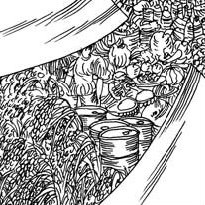
Sometimes when economists talk, they just like to talk in order to suit their target audience - to depict a picture it expects to see, whether it is one of an imminent storm or one of a fine day.
This is perhaps a disease for every profession when the criteria of success are tied so tightly with accepted performance rather than fresh ideas.
One of the things that the Chinese audience is being frequently told is that this country is now faced by a great danger, and that is inflation. In order to keep this economy competitive, the government will have to do everything it can to slow down the price rises, if not somehow arrest the trend entirely.
Consumers may like to hear this. But in reality, as tax payers and payers for all sorts of government subsidy programs, they are paying a heavy price for remaining seemingly away from the global trend - as the government is also to spend huge sums for its not quite attainable price targets.
Indeed, at a time when the whole world is awash with the so-called hot money, which means more money than things and opportunities it can buy, it is impossible for any major country to survive the present round of price rises unscathed.
As a manufacturing economy, China is exposed to a greater danger. It is already forced to accept material supplies with prices two times or even more of the past. However hard Chinese companies, or manufacturers in any other country, cut cost and improve efficiency, it is unreasonable to expect them to absorb all the price changes.
Without adjusting prices for finished products, government subsidies for industries depending on increasingly expensive material imports can only fuel further price rises in those materials. For material suppliers know for sure that there is a government preference there, and the government prefers continuously bailing out its money-losing industries to lifting the finished products' prices.

Once prices for the finished products are duly adjusted, as people saw from China's gasoline and diesel retail prices last week, the price rise in material supplies may become less strong rather than stronger.
At a time of general inflation, it is not feasible for one country to keep its prices unchanged, or at a remarkably lower level despite the financial cost. Even worse, subsidizing a few industries which already depend on overseas supplies for a hefty chunk of their material demand, can be very painful.
To keep doing so is like being taken hostage by factors that are hard to control. Nor does it provide any useful, and certainly not a long-term, protection to consumers.
There are also cases where subsidizing cheap energy supplies tend to encourage waste and emission. The only effective way to make human beings refrain from wasting is to raise the price in their consumption.
With all this, it is clear that Beijing's inflation target set in the early months of the year (4.8 percent year-on-year) has already become an anachronism considering the international background.
At the same time, it must be pointed out that there are other ways in which the government can be more effective in protecting the economy.
At least, China does not have to rely on the global food market as much as it does for energy. Contrary to outside observers' gloomy forecasts, it still can provide its 1.3 billion population with the basic food supplies. So long as Beijing can continuously generate higher productivity in farming, Chinese consumers can be much better off than those in other countries in the developing world.
All other conditions being equal, lower food prices are enough to sustain a nation's overall competitiveness in an inflationary time.
E-mail: younuo@chinadaily.com.cn
(China Daily 06/23/2008 page4)

